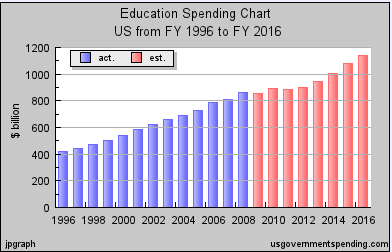Jacobs, W. E., McMahon wrote a thesis called
Counterpoint: Free College Education is Poorly Matched with the Needs of the Students or the Economy. In it he brings up counter points to why free education would be beneficial. With a mixture of our economy and a large drop out rate for current college students, Jacobs argues that free tuition does not benefit us.
This paper is helped used in my paper in the counter argument. I state that the government aids only soldiers. This article helps bring up facts that the GI Bill is from federal government and taxpayers would not be penalized if the government falls short on spending. Public education though would be another burden that falls on taxpayers.
"In making the case for free college education, many people are arguing that the GI Bill has been successful and should be replicated for the general public. However, the GI Bill uses federal funds to offset the tuition of college for military personnel; taxpayers are not required to fill in gaps where the government falls short (Page 1)." By understanding the differences between the GI Bill and what free tuition would be we must realize that free tuition would affect an already over burdened population of tax payers who are living from pay check to pay check.
"The National Center for Public Policy and Higher Education notes that investing in higher education for high school graduates can improve a state's economy: people with degrees get higher paying jobs, can spend more money, and can increase tax revenues. That would be a possible argument if the same Center didn't also cite that "less than 50 percent of first-time, full-time college students complete an associate's degree within three years or a bachelor's degree within six years" ( Page 1)." Currently it is mandatory for everyone to receive an education up to grade 12. After grade 12 when the average student turns 18, they become adults and have the ability to chose for themselves. With this many students who are new to college don't succeed and there is no system to catch them from failing. For most kids in high school there is a system to enable those to succeed. If we were to set free tuition for everyone we must realize that we will even be paying for those that don't finish their degrees.
"However, tuition is only about half the cost of a college education for most people. When room and board are factored in, as it is in the cost of the University of California, for example, even without tuition, students are still paying over $8,000 per year (page 1)". While the fight for education is what the common student is fighting for there are more bills that need to be paid. For some colleges the bill of living in the community is equal and even greater than free tuition. Although lowering tuition will ease the burden for students, in most cases they will still need to take out loans or find a job for living expenses.
The free education that we are fighting for isn't equal to the GI Bill. GI's receive free tuition, money for their living expenses and books. The free education that we are fighting for would only allow free tuition. Clearly there is a large divide between the common student and GI's, and we are not even setting our selves to be looked as equals to them on terms of education.
Works Cited
Jacobs, W. E., and Maureen McMahon. "Counterpoint: Free College Education Is Poorly Matched With The Needs Of The Students Or The Economy." Points Of View: Free College Tuition (2014): 3. Points of View Reference Center. Web. 3 Dec. 2014.

No comments:
Post a Comment